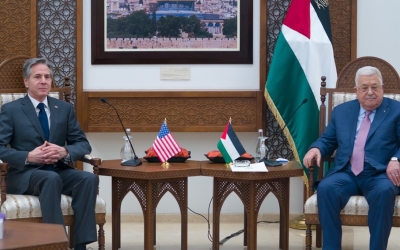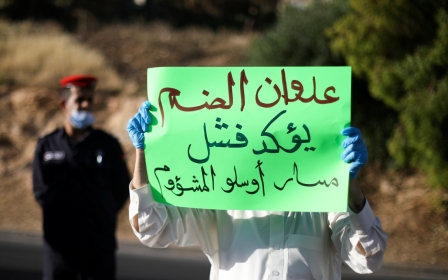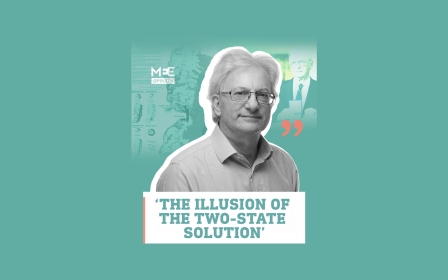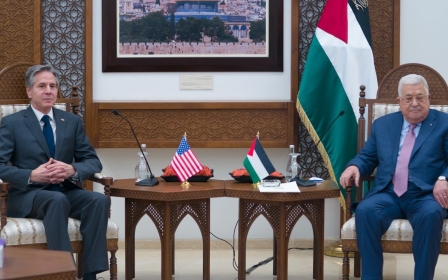From Oslo to the end of Israeli settler-colonialism
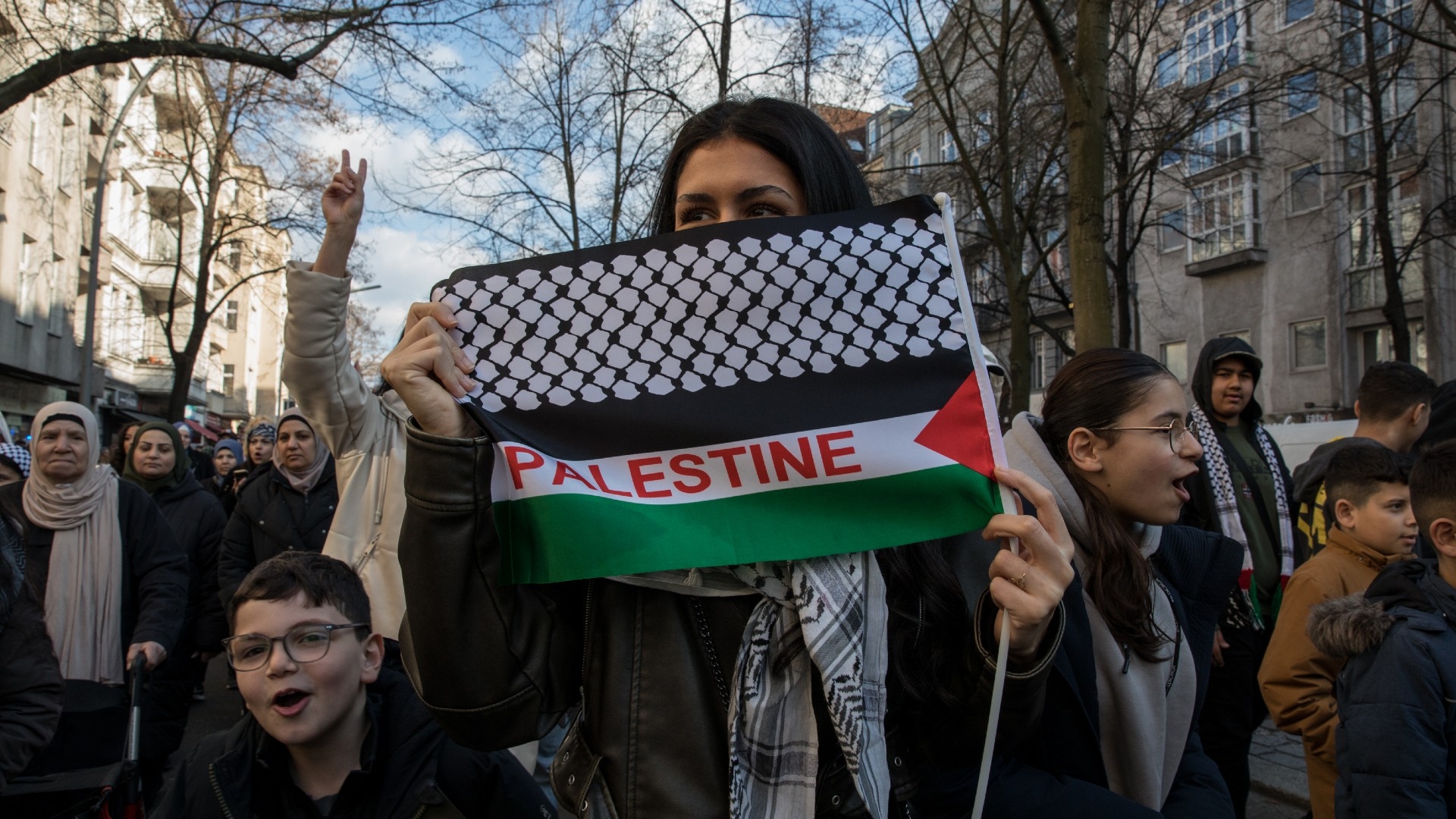
This month marks the 30th anniversary of the Palestine Liberation Organisation's (PLO) surrender to Israel under the rubric of the so-called Oslo Accords.
In September 1993, the Palestinian people were filled with hope because of the success of their steadfast resistance to Israeli settler-colonial occupation, to which they had been mounting a sustained revolt since December 1987, known worldwide as the Intifada.
The Tunis-based PLO, however, was hopeless.
Having lost the diplomatic support of the Eastern Bloc after the fall of the USSR and the financial support of the Arab Gulf autocracies following the Gulf War of 1990-91, the hopeless PLO had one last card to play: collaboration with Israel, its Arab friends and imperial sponsors to suppress the intifada.
The ongoing Palestinian struggle to defeat the Zionist settler-colonial project is a war between the hopefuls and the hopeless. It is the balance of power between these two groups that has long characterised the ebbs and flows of Palestinian resistance since its inception in the early 1880s when it encountered the earliest European Jewish colonists.
New MEE newsletter: Jerusalem Dispatch
Sign up to get the latest insights and analysis on Israel-Palestine, alongside Turkey Unpacked and other MEE newsletters
The Palestinian hopefuls were always at the forefront of the resistance, which became more organised in the 1920s. But the hopeless Palestinians who collaborated with the British, and the more hopeless still who collaborated with the Zionists, were also powerful and well organised.
In the 1930s, the hopefuls galvanised the greatest resistance yet, which manifested in the Great Palestinian Revolt of 1936-1939. Even then, the hopeless Palestinians, who were aided by the British and Zionists, formed counter-revolutionary gangs called the "peace bands" to kill members of the hopeful resistance.
Extinguishing hope
From the start, the Zionist movement banked on the acquiescence not only of the landed elites of Palestine, but also of the peasants and intellectuals, in its designs to dispossess the Palestinian people and steal their homeland for the benefit of Jewish settlers who would replace them.
The Palestinian hopefuls were always at the forefront of the resistance. But the hopeless Palestinians who collaborated with the British, and the more hopeless still who collaborated with the Zionists, were also powerful and well organised
Vladimir Jabotinsky, the Zionist leader who later founded right-wing Revisionist Zionism, understood as early as 1923 that Palestinian acquiescence could only be achieved when the Zionists were able to extinguish in the hearts of the Palestinians any hope that they could ever mount a successful anti-colonial struggle and defeat the colonists. "Every indigenous people will resist alien settlers as long as they see any hope of ridding themselves of the danger of foreign settlement," he wrote.
Indeed, as Palestinians were already resisting Jewish colonisation, they "will persist in doing [so] as long as there remains a solitary spark of hope that they will be able to prevent the transformation of 'Palestine' into the 'Land of Israel'".
Jabotinsky's understanding of Zionism's long-term strategy is most revealing: "All this does not mean that any kind of agreement [with the Palestinians] is impossible, only a voluntary agreement is impossible." This is so because: "As long as there is a spark of hope that they can get rid of us, they will not sell these hopes."
He added: "A living people makes such enormous concessions on such fateful questions only when there is no hope left." The task before Zionism was therefore to constantly extinguish hope in the hearts of the Palestinians - and even other Arabs - of ever defeating Zionism's colonial-settler project.
Hard as it has tried since its inception, Zionism has ultimately failed to extinguish the Palestinian hope for liberation.
The Zionist scheme, which included the proviso that "if it is impossible to get an endorsement of Zionism by Palestine's Arabs, then it must be obtained from the Arabs of Syria, Iraq, Saudi Arabia and perhaps of Egypt", was not persuasive to Jabotinsky.
"Even if this were possible, it would not change the basic situation. It would not change the attitude of the Arabs in the Land of Israel towards us," meaning that the Palestinians would remain hopeful of defeating Zionism, regardless of whether the Egyptians, Saudis, Iraqis, or Syrians made peace with Israel.
Jabotinsky elaborates that "an agreement with Arabs outside the Land of Israel is also a delusion". To extinguish the hope of Arab countries in defeating Zionism, "we would have to offer them something just as valuable. We can offer only two things: either money or political assistance or both."
It is here that the astute Jabotinsky miscalculated, believing that "we can offer neither", as the money was hardly sufficient for the Zionist project itself. He added: "Ten times more illusionary is political assistance for Arab political aspirations."
Jabotinsky laboured under the delusion that the Arab countries were run by Arab anti-colonialists who wanted to get rid of colonialism, and not by rulers who were already collaborating with western imperialism.
This is why he felt that given Zionism's alliance with colonialism, "we cannot intrigue about removing Britain from the Suez Canal and the Persian Gulf and the elimination of French and Italian colonial rule over Arab territory. Such a double game cannot be considered on any account."
What Jabotinsky failed to realise was that the Zionists could offer the Arab countries political assistance, not to oppose colonial influence, but rather to maintain and intensify its role in protecting the thrones of the monarchical Arab regimes.
Even the newly founded republics in the region immediately sought imperial sponsorship once their more progressive founders were overthrown. This applies as much to Sadat's Egypt as to the Jordanian, Moroccan, and most of the Gulf monarchies.
In the last two decades, the governing forces of Libya, Iraq, Sudan, and Tunisia have also either already allied with Israel or held secret talks aimed at normalisation. It was this political assistance that effectively dashed the hopes of the Arab regimes of ever liberating Palestine and raised their hopes of properly serving empire.
Nonetheless, Jabotinsky's exposition of the plans of the Zionist movement was clearly articulated based on his analysis of the political context of the early 1920s. Since the Palestinians' "voluntary agreement is out of the question. Zionist colonisation, even the most restricted, must either be terminated or carried out in defiance of the will of the native population. This colonisation can, therefore, continue and develop only under the protection of a force independent of the local population."
That force was Britain and the League of Nations, of course, and later after World War Two, it became the United States, the United Nations, and much of Europe.
Making concessions
In 1948, when Israel issued the Declaration of the Establishment of the Jewish State, it claimed its achievement was the realisation of Zionist hopes, which it alleged had always been "Jewish" hopes. "Exiled from Palestine, the Jewish people remained faithful to it in all the countries of their dispersion, never ceasing to pray and hope for their return and restoration of their national freedom."
What will determine the outcome of the Palestinian struggle against settler-colonialism is the hope that continues to inspire the resisting Palestinians
Indeed, "hope" is enshrined in the very title of the Zionist national anthem Ha-Tikvah meaning "The Hope", in which Zionists reiterate: "Our hope - the 2000-year-old hope - is not lost: to be a free people in our land, the land of Zion and Jerusalem."
Unfortunately for the Zionists, Ha-Tikvah was in fact written by a failed Zionist, the Ukrainian-Austrian Jewish colonist Naphtali Herz Imber. He arrived in Palestine in 1882 and worked with the British Protestant Zionist Lawrence Oliphant, who had devised plans to create agricultural colonies for European Jews.
Seven years later, in 1889, Herz Imber lost hope in both Protestant and Jewish Zionist plans for settler-colonialism and left for greener pastures, ending up in that other European settler-colony, the US, where he lived out his remaining years. The rest of the Zionists, however, remained hopeful that they could extinguish Palestinian hopes of resisting them.
Predicting the conditions that would lead to the demise of the PLO in Oslo, Jabotinsky insisted that when hope was fully extinguished, "only then do extreme groups lose their sway, and influence transfers to moderate groups. Only then would these moderate groups come to us with proposals for mutual concessions. And only then will moderates offer suggestions for compromise on practical questions like a guarantee against expulsion, or equality and national autonomy."
This was essentially what the PLO and its affiliated Palestinian intellectuals offered as concessions for the Oslo process, though Israel gave them no guarantees on anything.
Jabotinsky was clearly prescient about the transformation of the Palestinian national movement that began in the early to mid-1970s and led to the PLO's final degradation into the collaborator Palestinian Authority in 1994.
However, what he did not account for was the failure of Israel, its Arab allies, and its PA collaborators to extinguish hope in the hearts of the Palestinians.
Since the late 1980s, the "extreme groups" - meaning those hopeful resistance groups that demand the end of Zionist settler-colonialism - have only ascended in popularity and continue to gain momentum with Palestinians hoping and believing that the Zionist project can truly be defeated.
It is true that the bulk of hopeless liberal Palestinian intellectuals supported Oslo and the PA regime that came after it from the start and many even served as ministers in its cabinets for years before they exited and criticised it, while others continued to work with it. Other supporters slowly but surely became disenchanted with it over the last thirty years.
This week, a number of Palestinian intellectuals critical of the PA felt impelled to openly condemn Mahmoud Abbas’s offensive views of European Jews collectively but had not seen fit in the last two months to issue collective condemnations of his heightened collaboration with Israel since its invasion of Jenin and the ensuing PA murderous campaign on Israel's behalf against the Palestinian resistance. Their letter was criticised by other Palestinians.
But what will determine the outcome of the Palestinian struggle against settler-colonialism is the hope that continues to inspire the resisting Palestinians, a hope that is constantly rekindled by Israel's cruel and unending oppression of the Palestinian people.
It is these hopeful Palestinians who have been resisting Israel in Gaza, the West Bank, and even inside Israel itself, since the Oslo surrender was signed, and it is they whom the hopeless Palestinians, Israelis, their Arab collaborationist friends, and imperial sponsors have failed to defeat.
The views expressed in this article belong to the author and do not necessarily reflect the editorial policy of Middle East Eye.
Middle East Eye delivers independent and unrivalled coverage and analysis of the Middle East, North Africa and beyond. To learn more about republishing this content and the associated fees, please fill out this form. More about MEE can be found here.



